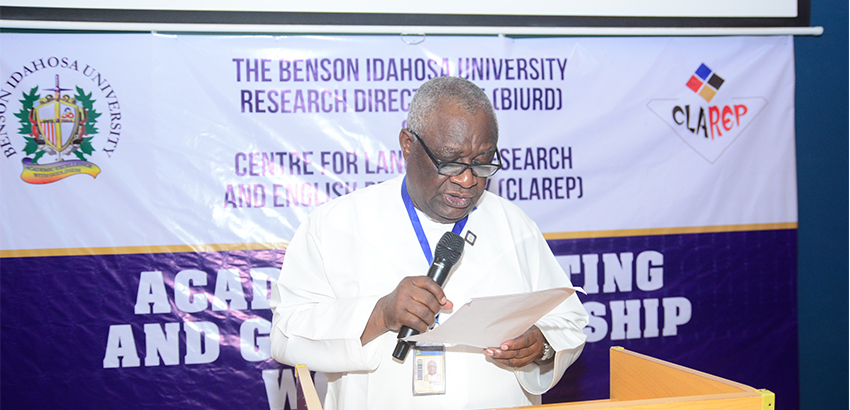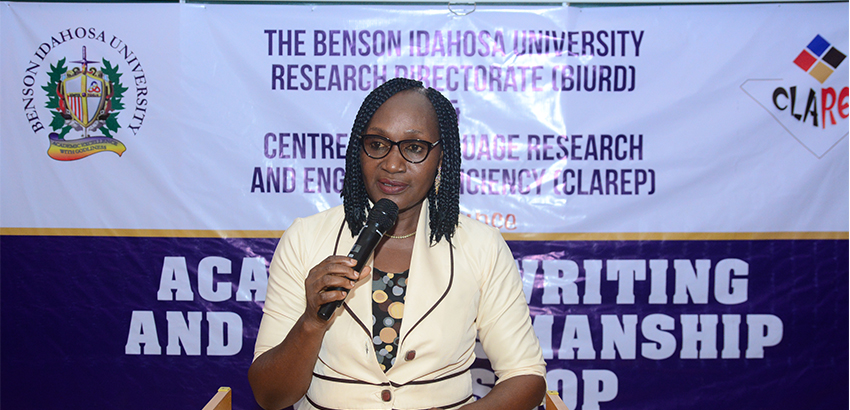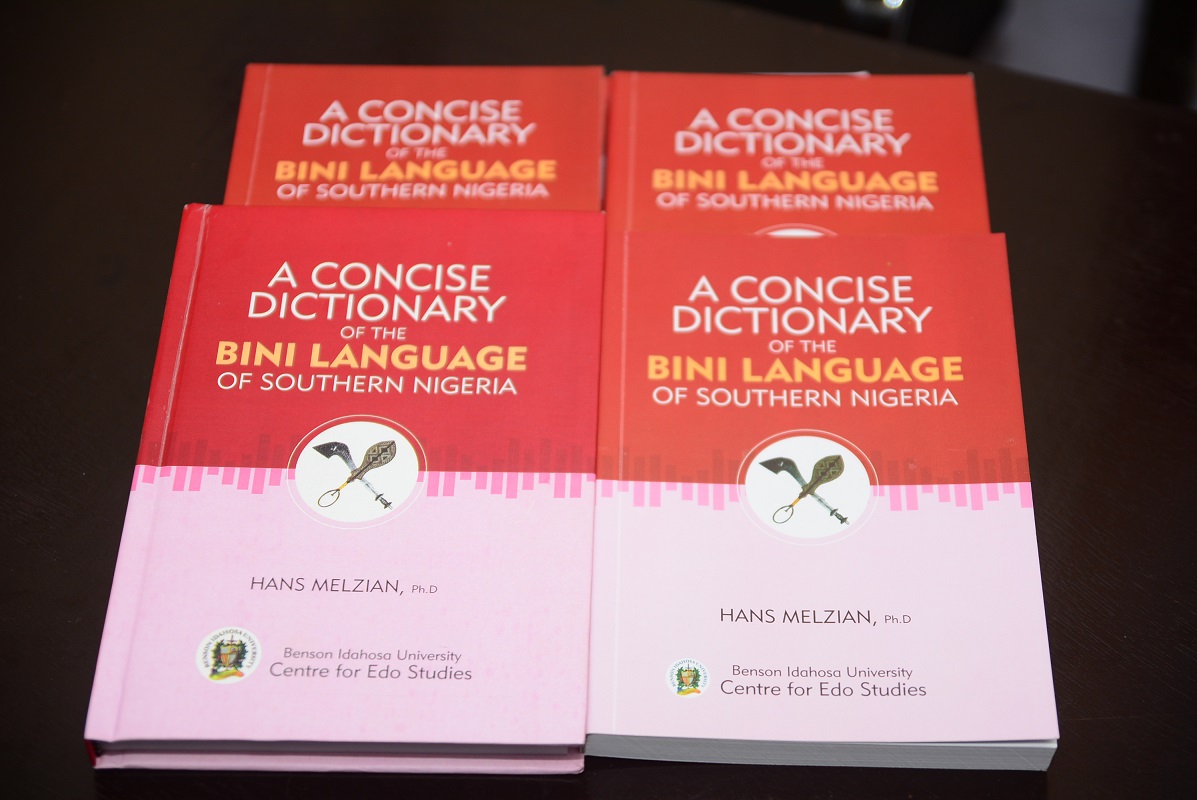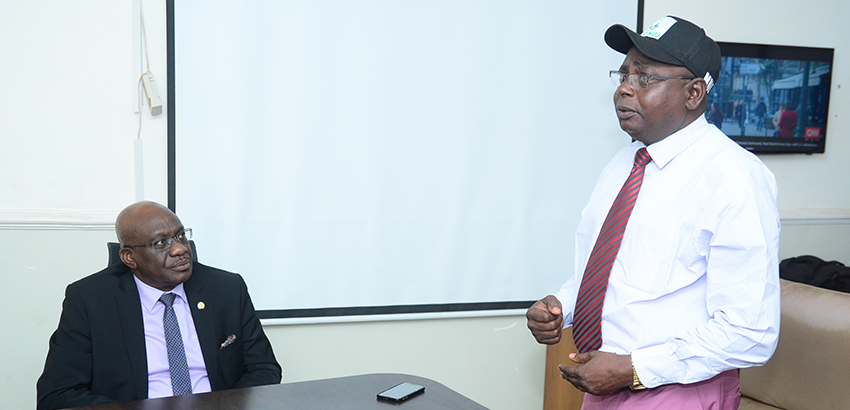Archives for the Year: 2019
The Dean, School of Post graduate Studies, Prof. Sanni Bamidele, has said that in the next ten years, school fees alone would not be sufficient to sustain universities, hence the need for alternative sources of fund.
He made this known during the Academic Writing and Grantmanship workshop organized by the Benson Idahosa University Directorate of Research and the Centre for Language Research and English Proficiency (CLAREP).
He said that in seeking alternative sources of fund, the conduct of world class research came to his mind.
He said: “The big question that came to mind in pursuing this plan was, who are those to conduct world class research at Benson Idahosa University by 2030 to attract 40% revenue”? Looking around Benson Idahosa University community for answer to this question, I could see a lot of potentials waiting to be harnessed. Realising that potential alone would not deliver our strategic goal; the Vice Chancellor’s first mandate to the Directorate of Research was to build the capacity of academic staff of Benson Idahosa University towards achieving our strategic goal. Thus, this workshop on academic writing and grantmanship is a product of that mandate
According to him, the establishment of this unit is very strategic to the University’s vision of ensuring that at least 40% of its revenue by the year 2030 comes from research
In her welcome address, the Director of Benson Idahosa University Research Directorate, Prof. Alexandra Esimaje, said that the workshop seeks to build knowledge capital and also build capacities for skills through academic mentoring and knowledge transfer.
She assured participants that after the workshop, their academic and research profiles will receive a boost and their visibility of at the planes of scholarship highly enhanced.
The 2-day workshop which was hosted by Benson Idahosa University had facilitators and participants from various universities from across Africa.
The Acting Dean, Faculty of Law, Dr. (Mrs.) Theresa Akpoghome, in this interview with Communication and Brand Strategy Unit (CBSU), speaks on the dwindling quality of education, misplaced government priorities, and adverse effects of plagiarism.
Excerpts:
How will you rate the country’s education sector?
I would say that we are trying but there is room for improvement. We are not there yet. In terms of percentage, I will rate Nigeria 55%.
What factors can be blamed for the dwindling quality of education?
First and foremost, the quality of inspection and supervision of schools by the regulators has dropped. This is made worse by the culture of corruption and lack of integrity among the education stakeholders.
Most schools lack well equipped libraries. This can be attributed to insufficient funds at the disposal of most schools. Few years back we had situations where states could boast of Libraries, and students were in the habit of going to Libraries to study, even during holidays. That culture has died and Libraries exist today to fulfill all righteousness. We must understand that the Library is the heart beat of any institution and efforts must be made to equip libraries. The Library stock comprises texts needed to support teaching and learning as well as specialized texts and journals to support research at all levels.
Some students want to earn degrees without working for it. They must be made to understand that it pays to study and they must apply themselves to the primary reason why they are in school.
It is sad that some parents have relinquished their responsibilities towards their children. These parents believe that it is a colossal waste of time to send children to school as most graduates are unemployed. Instead of encouraging their wards to study, they prefer to have them assist in their petty trading. Some parents even allow their wards to buy grades and enroll them at “miracle centers” for external examinations.
How do you think the government can assist the Private Higher Institutions?
The difference between private and public universities lies in the means of funding them. Government funds public universities while the private universities are tied to the tuition fees they receive. This simply means that tuition fees in private universities are heavy while that of public schools are subsidized with the tax payers fund. While the argument of funding private universities with tax fund will always go against the private universities, the government can still do a lot to enhance the fortunes of the private universities.
Private universities and their students can access loans and scholarships. Since they do not benefit from the Tertiary Education Trust Fund (TETFUND), they should be able to access loans operated by the Nigerian Education Bank. Parents of children in public and private universities pay taxes and their wards should not be denied access to the benefits of these taxes
Again, Government must ensure a level-playing field for all actors in the industry. The criteria for approving courses for schools must be the same both on paper and in practice. Owners of private universities must not be given unattainable standards to meet before approval can be given to them, when it is obvious that some government owned schools do not have ‘all’ that is required before they take off.
There is always an argument about the better between students of public and private universities. How can this be resolved?
Well, the argument is not one that can be resolved. There are excellent students in both private and public universities. Both institutions have their areas of strength and weaknesses also. But I can tell you that most Private Universities are better equipped than public schools. The student population is not much so, the facilities are adequate and better managed. The curricula of Private Universities are often more progressive. They are not rigid. Whether one attends a private or public university is a question of choice.
What are the adverse effects of plagiarism?
Plagiarism is the act of copying another person’s ideas or works and passing them off as yours without due acknowledgement. It is academic dishonesty and an ethical offence. Plagiarism is a problem because the people who plagiarize deprive themselves of opportunities to learn. The consequences vary from one jurisdiction to another. In Nigeria for instance, you can be suspended, made to repeat the assignment or retract the publication in question with apology. Your promotion can be stepped down or delayed. In some climes like the United States of America students can be expelled from school. It may be considered as misdemeanors punishable by fines and jail terms, not exceeding one year. It could also be a felony in some countries.
The Benson Idahosa University Centre of Edo Studies has produced a concise dictionary of the Bini Language of southern Nigeria. The dictionary provides a rich data of bini words and its meaning.
Theme : Living a balanced life.
Date: 16th to 17th April, 2019.
Time : 9 am to 3 pm daily.
Venue: Benson Idahosa University, Benin City.
For enquiries:
Dr. Omonigho Daniel 08038554711
Mrs Ameze Okungbowa 08077413177
Dr. Frances Olisaka 08120796894
The Governing Council of Benson Idahosa University (BIU), has approved the appointment of Prof. Sam Guobadia as the institution’s Vice Chancellor with effect from 1st April, 2019.
Prof. Guobadia’s appointment was approved at the Council’s 92nd regular meeting.
He is the sixth substantive Vice Chancellor of the University.
Until his recent appointment, he was the Acting Vice-Chancellor of BIU. He was also the University’s Deputy Vice Chancellor before the Acting position of Vice Chancellor. He has previously held several administrative positions within the University system.
Prof. Guobadia is a seasoned Professor of Economics. He is a fellow of and member of several professional bodies.
The entire Benson Idahosa University Community felicitates with Prof. Sam Guobadia on his appointment.
CONGRATULATIONS.
The Management of Benson Idahosa University received a nine-man team from the Council for the Regulation of Engineering in Nigeria (COREN), on accreditation visit, to assess the quality of the University’s engineering programme.
Addressing the team, the Vice Chancellor, Prof. Sam Guobadia, said that the University takes accreditation exercise seriously and harps on objectivity on the part of the accreditation team.
He tasked the team to feel free to mention the areas that needs to be worked on to make the programme more robust. Guobadia assured them of the University’s unflinching cooperation and readiness to adhere to all professional advice offered and to correct, implement and execute whatever recommendations made.
Briefing the Management after the accreditation exercise, the leader of the expressed satisfaction with the things they saw and enjoined the university to keep up the pace of developmental projects
I, on behalf of the Chancellor, President, Governing Council, Management, Senate, Staff, and Students of Benson Idahosa University, join millions in the world to remember a legend, our founder and the first Archbishop of Church of God Mission International (CGMi), Archbishop Benson Andrew Idahosa.
It’s exactly twenty-one years ago since you transited into glory. Your impact in Christendom and humanity is indelible. You were a leader par excellence, a father to many, a fearless (infact, bold personified) preacher, a mentor, a visionary, the list is endless.
We remember you today Papa, (as you were fondly called). We here on earth are left to carry on your legacies. Your memories remain blessed as stated in the scripture. We love you.
Prof. Sam Guobadia. Ph.D, FICA, FIPMD
Vice Chancellor
Benson Idahosa University
The Vice Chancellor, Prof. Sam Guobadia, has called on journalists to strive for balanced reporting in the discharge of their duties.
He made the call while receiving executive members of the Nigerian Union of Journalists (NUJ), Edo State chapter, who paid him a courtesy visit on Tuesday, March 5, 2019.
Welcoming the team, the Vice-Chancellor said he was delighted to have them visit the University. He charged them to work hard to report facts all the time.
He said: “Nigeria is a tough place right now, and you guys must strive very hard to be very independent. You must work very hard to carry out investigative journalism; you must work very hard to report the facts all the time and you must work very hard to defend the public and the society will be willingly to work with you more.”
“I want you all to understand your role in this country that it is extremely important. You play a significant role in making sure that our country develops to be as good as any other clime in the world,” he added.
He commended the journalists in the state for partnering with the institution in its developmental strides. Prof. Guobadia urged journalists in the state and the country at large to be fair in all their reports in the interest of country first and in things which would unite rather than divide. He further assured the union that the University will continue to work with them to strengthen the profession
The Vice Chancellor also advised the NUJ leadership to work assiduously to improve on the standard of the profession in Nigeria. He stated that the future of any country depended a lot on journalists.
The chairman, NUJ, Edo State Council, Roland Osakwe, who described the Vice Chancellor as a media-friendly administrator, said the media in the state would continue to work in harmony with the authorities of Benson Idahosa University authorities.
According to him, there should be a strong synergy between the University and the media for effective, credible and balanced reportage of government’s activities
He commended the Vice Chancellor, stressing that the University has experienced tremendous development for a long time.









